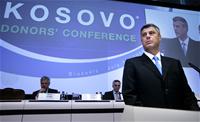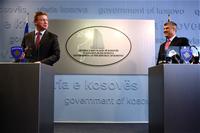The first elections in independent Kosovo - high turnout and claims of irregularities
Evelyna Topalova, December 16, 2010
 Preliminary results from the December 12th vote show that the Democratic Party of Kosovo (DPK) of outgoing Prime Minister Hashim Tachi and its former coalition partner - the Democratic League of Kosovo (LDK) - will keep their leading role in the new parliament. A new key player however emerged after these elections - the Self-Determination movement of Albin Kurti which is sending representatives to the parliament for the first time and which, according to the results, will be the third force in the 120-seat Assembly. The radical movement is well ahead of the Alliance for the Future of Kosovo led by former Prime Minister Ramush Hardinaj who is awaiting re-trial before the Hague tribunal for war crimes.
Preliminary results from the December 12th vote show that the Democratic Party of Kosovo (DPK) of outgoing Prime Minister Hashim Tachi and its former coalition partner - the Democratic League of Kosovo (LDK) - will keep their leading role in the new parliament. A new key player however emerged after these elections - the Self-Determination movement of Albin Kurti which is sending representatives to the parliament for the first time and which, according to the results, will be the third force in the 120-seat Assembly. The radical movement is well ahead of the Alliance for the Future of Kosovo led by former Prime Minister Ramush Hardinaj who is awaiting re-trial before the Hague tribunal for war crimes.
As expected, Serbs in northern Kosovo, who remain loyal to Belgrade, boycotted the vote organised by Pristina institutions. Serbs in southern and central Kosovo, unlike them, went to the polls. Ahead of the elections Slobodan Petrovic, leader of the Independent Liberal Party, predicted that in case of strong mobilisation of Serbs they could send up to 30 representatives in the parliament which would give them the opportunity to become an important decision-making factor. Hypothetically, the next president of Kosovo could be a Serb, he said. These predictions however can not come true for the time being.
Preliminary results have shown that formation of a new government in Pristina will not be an easy task. Although Thaci's PDK came first it will not be able to set up a government on its own and will have to seek coalition partners among at least two political parties. Most of the political subjects that are to be represented in the parliament however excluded such a possibility blaming the party for the wide-spread corruption and poor economic situation. Flagrant irregularities registered during the election process in two Kosovo municipalities - PDK's strongholds - will likely make it difficult striking a coalition deal. Only to illustrate the situation - turn-out in Kosovo was over 47% but in the municipalities of Srbica and Glogovac it was 94 % and 86 % respectively.
Several corruption scandals have shaken Kosovo's political scene this year. Among  prominent figures targeted by EU Rule of Law Mission's (EULEX) anti-corruption probe was Central Bank Governor Hashim Redxepi and Telecommunications Minister Fatmir Limaj.
prominent figures targeted by EU Rule of Law Mission's (EULEX) anti-corruption probe was Central Bank Governor Hashim Redxepi and Telecommunications Minister Fatmir Limaj.
The newborn country in Europe is also among the poorest. The unemployment rate rose to almost 50%, corruption is wide-spread while foreign investments have dropped. Given this situation no one should be surprised that dissatisfaction with outgoing cabinet is growing and new political subjects gather strength.
Among the big winners in these elections is the nationalist Self-Determination movement
The movement led by former student leader Albin Kurti is known for its opposition to international presence in Kosovo, calls for independence and refusal to hold any talks with Belgrade on the status. Self-Determination also does not recognise court rulings issued by EULEX judges. In June Kurti was sentenced to nine months in prison for his involvement in a demonstration in Pristina on February 10th 2007. The protest was called against Marti Ahtisaari's plan for international supervised independence of Kosovo. Back then two activists of the movement were killed while dozens were injured.
The other political subject that scored serious points was the New Spirit Party which, according to the preliminary results has won 2.2 % of the votes. The party was registered just before the elections with the aim to harvest the dissatisfaction from the governance and to lead a fight against crime and corruption.
The first urgent task before the authorities is to deal with bulk of complaints for irregularities on the election day in order to avoid the risk of challenging the results and Albania-like scenario of political stalemate.
 Another serious post-electoral challenge incumbent Prime Minister and former leader of the Kosovo Liberation Army (KLA) Hashim Thaci is facing is a Council of Europe's report which contains serious allegations against him. According to the document quoted by the Guardian newspaper that is to be presented on Thursday by Rapporteur Dick Marty, Thaci is the head a "mafia-like" Albanian group responsible for smuggling weapons, drugs and human organs through Eastern Europe. The daily says the report was drafted after a two-year long investigation and was citing intelligence sources such as the FBI.
Another serious post-electoral challenge incumbent Prime Minister and former leader of the Kosovo Liberation Army (KLA) Hashim Thaci is facing is a Council of Europe's report which contains serious allegations against him. According to the document quoted by the Guardian newspaper that is to be presented on Thursday by Rapporteur Dick Marty, Thaci is the head a "mafia-like" Albanian group responsible for smuggling weapons, drugs and human organs through Eastern Europe. The daily says the report was drafted after a two-year long investigation and was citing intelligence sources such as the FBI.
Kosovo's government immediately dismissed the allegations calling them defamation and an attempt to tarnish the image of the KLA. Marty's probe does not amount to a criminal investigation but poses serious questions about Thaci's credibility and the country's capability to deal with organised crime.
 Bakir Izetbegovic, Andrej Plenkovic | © Council of the EU
Bakir Izetbegovic, Andrej Plenkovic | © Council of the EU Aleksandar Vucic, Recep Tayyip Erdogan | © Serbian Presidency
Aleksandar Vucic, Recep Tayyip Erdogan | © Serbian Presidency Jean-Claude Juncker, Zoran Zaev | © European Commission
Jean-Claude Juncker, Zoran Zaev | © European Commission